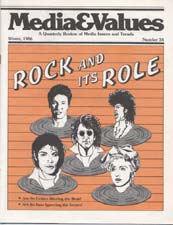GLOBAL: It's a Small World For Pop Conglomerates
|
This article originally appeared in Issue# 34
|
One of the greatest shocks for the western traveler comes from visiting a remote village in a distant land and finding a Michael Jackson poster on the wall and the strains of his latest hit album blasting from a portable tape player.
Clearly the rock music culture is not just a U.S. phenomenon. But while it is obvious that music merchants have made the whole world their marketplace, it may not be so apparent how other countries, and their musicians, are caught into - and sometimes co-opted by - a music industry that is truly multinational.
A taste for rock music began spreading in the 1960s with international student travel, tour in, migrations of workers from developing countries, travel by elites and, of course, commercial marketing. For many, rock was already a style of protest and most pop variations arose as the expression of political or ethnic nationalism, anti-colonialism or occasionally some overtone of religious revitalization (e.g. reggae music among Rastafarians).
Initially, local radio resisted pop music because state-owned broadcasting corporations (and colonial elites) made commitments to "good music" in the Western high culture tradition. As a result, musicians had to use disc and cassette recordings to get their music heard. This led to the development of local, independent recording studios and small record companies.
By 1978 five multinational record corporations - CBS, Warner-Electra-Atlantic and RCA (all USA), EMI (United Kingdom) and Polygram (Germany and Holland) - controlled 60% of world record sales and had developed a fine-tuned strategy for spotting new market trends. Despite the continual new crop of small local independent companies, most are eventually bought up, become small multinationals or go bankrupt.
In a superb analysis, Roger Wallis and Rrister Malm have reported detailed information from the Music Industry in Small Countries project in Big Sounds from Small Peoples. They show that the influence of multinationals is far more complex than earlier studies have indicated:
- Cultural interchange and borrowing stimulates local music
- Cultural domination becomes destructive to local forms
- Cultural imperialism adds an economic, marketing dimension and forces local music to become a commercial product in order to compete
- Transculturalization creates a synthetic, artificial music out of many local elements thus forming something new like disco music. This is not the authentic expression of any national or ethnic group and marketing is carried out in worldwide campaigns
Rock may indeed be an international musical form but we cannot forget the price paid to forge new voices into the multinational mainstream.



